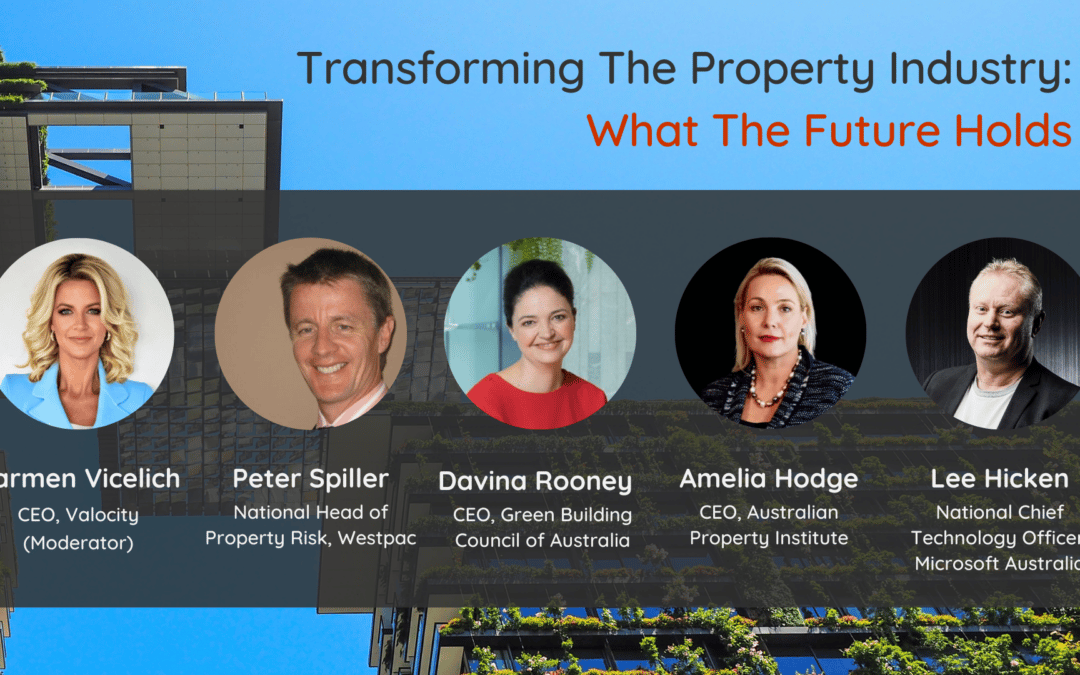“Innovation is the ability to see change as an opportunity and not as a threat” – Steve Jobs
Technology and digitisation are accelerating significant shifts in the way we live and work across every sector globally. Investment in fintech reached highs in 2021 that have never been seen before, which demonstrates a recognition and understanding of the importance of technology and financial inclusion globally. While we navigate our businesses through a time of extreme change, we need to consider not just technology but also our wellbeing, sustainability, and the environment, and how these factors all impact the property ecosystem we operate within.
Valocity CEO Carmen Vicelich recently hosted a panel of highly regarded thought leaders from the banking, property, and technology sectors across Australia to share their insights and perspectives on the evolution of property valuation and lending, green finance and sustainability.
Thank you to our panel for their incredible insights:
Peter Spiller National Head of Property Risk, Westpac
Davina Rooney CEO, Green Building Council of Australia
Amelia Hodge CEO, Australian Property Institute
Lee Hicken National Chief Technology Officer, Microsoft Australia
Carmen Vicelich CEO, Valocity
Technology will enable property valuation to shift from ‘what is’ to ‘what will be’
For Westpac’s National Head of Property Risk, Peter Spiller, property valuation is one of the most critical parts of due diligence for lenders during consideration of, and for the duration of a loan. While the property valuation landscape has remained static for a long time, we are now seeing disruption that is changing how this information is created, captured, and accessed by lenders.
“The dynamic has changed over the past ten to fifteen years” Peter says. “The market now has an increasing ability to access very deep and comprehensive data across many asset classes and geographies. You can subscribe to this data from service providers like Valocity that can put that data together, slice and dice it and produce a valuation based on much deeper and current data than we’re used to”.
But it’s not just access to the data that is evolving. Peter expects to see lenders using the “deep data that’s now available to ascertain where the asset is in its cycle, and very importantly how that cycle may move over the coming years”. It is highly likely that this evolution in technology, access to data and analytics will shift the lending picture from ‘what is’ today, to what may happen in the future. As Peter says, “watch this space!”
We all have a role to play in sustainable property and green finance
Davina Rooney, CEO of Green Building Council of Australia discussed how property is responsible for around 40 per cent of the world’s carbon budget and 50 per cent of materials used. The focus is now shifting to taking property to Net Zero, and according to Davina, “unlike other sectors we know exactly what Net Zero looks like, we think Net Zero in property is a highly efficient building powered by renewables with less intensive material. While sustainable properties have the obvious environmental benefits, the also data shows strong commercial outcomes”. Davina goes on to state that valuations are 5% higher, their returns are 13% more and the weighted average lease expiry is 25% longer. “Put together, more people want to stay in these spaces and when they go into them, they stay for longer.”
Davina spoke of her passion for green finance and that while there is enormous interest in this space, it’s an area that’s ripe for transformation. “There’s a lot of friction in these processes. Instead of going through long, cumbersome processes, the sector needs digital projects so we can run through a smooth transition and spend our time delivering more market transformation. There’s an enormous opportunity in this space.”
ESG should be top of mind
For Amelia Hodge, CEO of the Australian Property Institute, 2022 is the year for a change. “It’s our role as the industry body to embrace innovation and harness its opportunities for the benefit of [the property valuation] profession that plays a very important part in this ecosystem.”
“It’s evident that with the acceleration of technology’s adoption we’ve got to harness resources to grow efficiently, enhance regulatory frameworks and standards, look at our reporting outputs and also take that skillset and mindset shift into what is the future of the valuation profession.”
While all these factors contribute to a more innovative, efficient, and value-based property sector, a key focus of the Australian Property Institute is environmental, social, and corporate governance (ESG) and what this means for the valuation profession. Amelia says, “In the ecosystem, we need to have a look at and revolutionise some of our standards that will provide that regulatory framework and guardrails around the evolution of the product.”
For some, working within an ESG framework will require a skill and mindset shift, which may be uncomfortable and bring its own set of challenges. However, the significant role ESG plays in the property ecosystem in a co-design and collaborative approach will ensure the industry is geared up to achieve to adapt to an everchanging environment, both today and into the future.
Software is eating the world
Microsoft Australia’s National Chief Technology Officer, Lee Hicken posed a challenge; “Think a little bit about the work you do, the jobs you exist in and the organisations you operate within, think about any aspect that doesn’t rely on technology to either operate it or support it – I suspect you won’t be able to think of one.”
In terms of adoption of digital technologies in business, there are three things to consider according to Lee. “The first is this idea of digitising the data that feeds your business. Data is the key to how you’re going to transform your business – if you’ve got the data, get it in one place where you can start to see the big picture.”
“Once you have that data digitised, you then need to think about digitalising the processes that run the business. Think about the touchpoints between your clients, the systems you operate, your employees and how innovation happens in your business. You can’t rely on IT alone and assume that your IT shops and outsources are going to innovate in this digital process. You’ve got to engage all parts of the business.”
“The third point is resiliency. If you’re going to invest deeply in digitised data, digital systems and processes, you’re going to fail to return any value on that investment if you don’t build resilience into your core principles and operations. That resilience is your people, the culture and the processes that they have at their fingertips to enable all of that to come to fruition.”
And finally, even though software may at the heart of the technology shift, it’s also important to remember that people are the key users and operators of the software. “Empower your people. Invest in skilling and retooling your systems, but also invest in retooling your people.”
“We always overestimate the change that will occur in the next two years and underestimate the change that will occur in the next ten.” – Bill Gates
About Valocity
Valocity is an award winning FinTech company transforming and digitising the property decisioning process globally with customers across Australia, New Zealand, India, and Asia.
Valocity digitises the entire property valuation process with its unique cloud-based valuation platform, with bespoke solutions for residential, commercial, and agricultural lending.
It combines the best of nationwide property data with global technology and advanced analytics expertise to create digitally connected workflows, automated valuation models, customised insights, and desktop valuations that enable data driven decision making and more seamless customer experiences.
For more information, please visit valocityglobal.com or contact
Sara Pesic, Head of Marketing, Valocity

